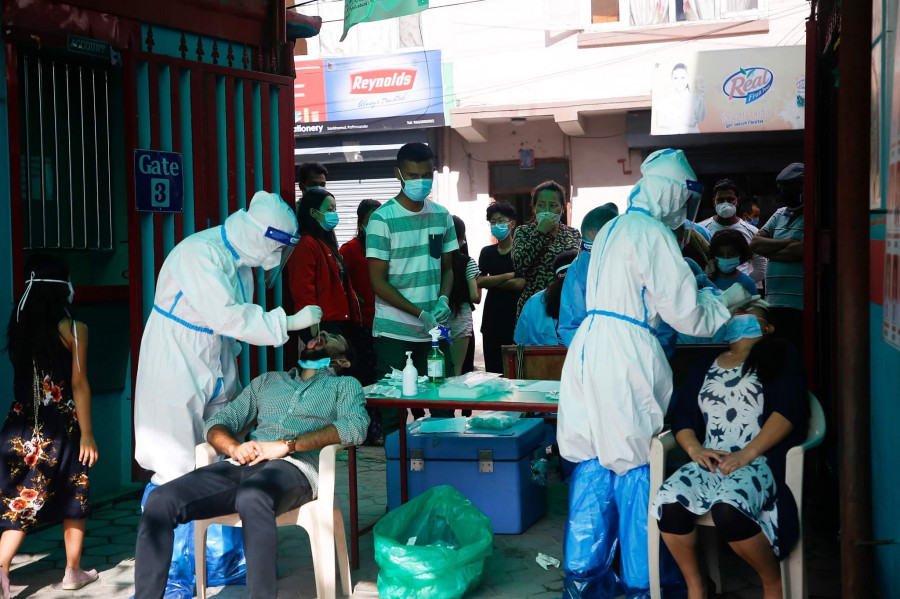Health
Government may reimpose lockdown if coronavirus infections continue to spike
The government’s failure to expand the test range and increase in public mobility post lockdown have raised the infection risk, Health Ministry officials say.
Arjun Poudel
Even as the risk of the spread of coronavirus grows across the country and lockdown has been reimposed in Biratnagar and Inaruwa in Province 1 due to resurgence of infections, the number of tests has not gone up since the lifting of the countrywide lockdown last week.
Authorities in Biratnagar said following the cases suggesting community transmissions in the provincial capital and the town of Inaruwa, lockdown orders were issued in both places on Sunday.
"Challenges have increased for us to protect health workers and security personnel deployed in the frontline to prevent the spread of the virus and to serve the people," Dr Roshan Pokhrel, chief specialist at the Health Ministry, told the Post.
Twenty-one police men in Biratnagar regional police office, four at police headquarters, 20 personnel from the Armed Police Force office in the town of Kakadbhitta on the Nepal-India border in Jhapa district and six in Ilam in recent days have tested positive for the coronavirus infection, authorities said.
Around 150 health workers across the country have also contracted the virus since the start of the pandemic.
While lockdown orders have been reimposed only in towns and districts along the Nepal-India border, the upward infection trend in recent days suggests that the government could reimpose a countrywide lockdown.
“We will have to enforce another lockdown if the number of positive cases spike fast,” said Dr Sameer Kumar Adhikari, joint spokesperson of the Health Ministry.
There has been an exponential rise in cases in India since the lockdown was lifted there a few weeks ago, according to Johns Hopkins University coronavirus tracker. Although 700 to 900 people have been entering Nepal from India everyday, as per the data of the Ministry of Home Affairs, elected representatives in the border districts claim that many more people are entering the country through illegal border crossings.
Although public health experts had called for the need to increase the test numbers after the lockdown was lifted, according to Ministry of Health and Population data, only 15,322 tests were performed in four days after the lockdown was lifted, with an average of about 4,000 tests a day.
The number of tests four days before the lockdown was 15, 251. The most number of tests on a single day across the country stands at around 7,000 during the lockdown. Meanwhile, three youths are on a hunger strike for the past nine days demanding the fulfillment of the government’s promise to raise the test to 10,000 per day.
“The Health Ministry’s recommendation on increasing the number of tests alone is not enough,” said a senior Health MInistry official requesting anonymity because he is not authorised to talk to the media. “There are other factors involved.”
He said the recommendation of the Health Ministry is not taken into account while the Cabinet makes its decision..
Those outside the government point out that the government has lessened its focus on containing the spread of the virus.
“Earlier, the entire government was focused in the fight against Covid-19. But with the end of the lockdown, responsibility of containing the disease has come mainly to the Health Ministry,” said Dr Senendra Upreti, a former health secretary.
Public health experts say that an increase in the number of tests and active surveillance was the only way to contain the spread of the virus after the lockdown was lifted, but that is not happening.
Government officials are aware of this as conceded by a member of the Covid-19 Crisis Management Center.
“The concerned authorities seem to be indifferent when it comes to regulating public movements and conducting active surveillance,” a government official told the Post requesting anonymity.
At present only those who have come in close contact with an infected person, those who have a history of travelling to the coronavirus hotspots and those with all Covid-19 symptoms are being tested.
Unless the government changes the guidelines to test all symptomatic cases, even if only one, and conduct active community surveillance, test numbers will not increase, which means there is increased risk of spread of the virus, according to infectious disease expert Anup Subedee.
But the public needs to be vigilant too.
“Lockdown was lifted thinking that people have been aware of the risk of infection and would take safety measures, but the size of crowds in markets show that this has not happened. We seem to have expected too much from the public,” said joint spokesperson Adhikari.




 8.79°C Kathmandu
8.79°C Kathmandu















